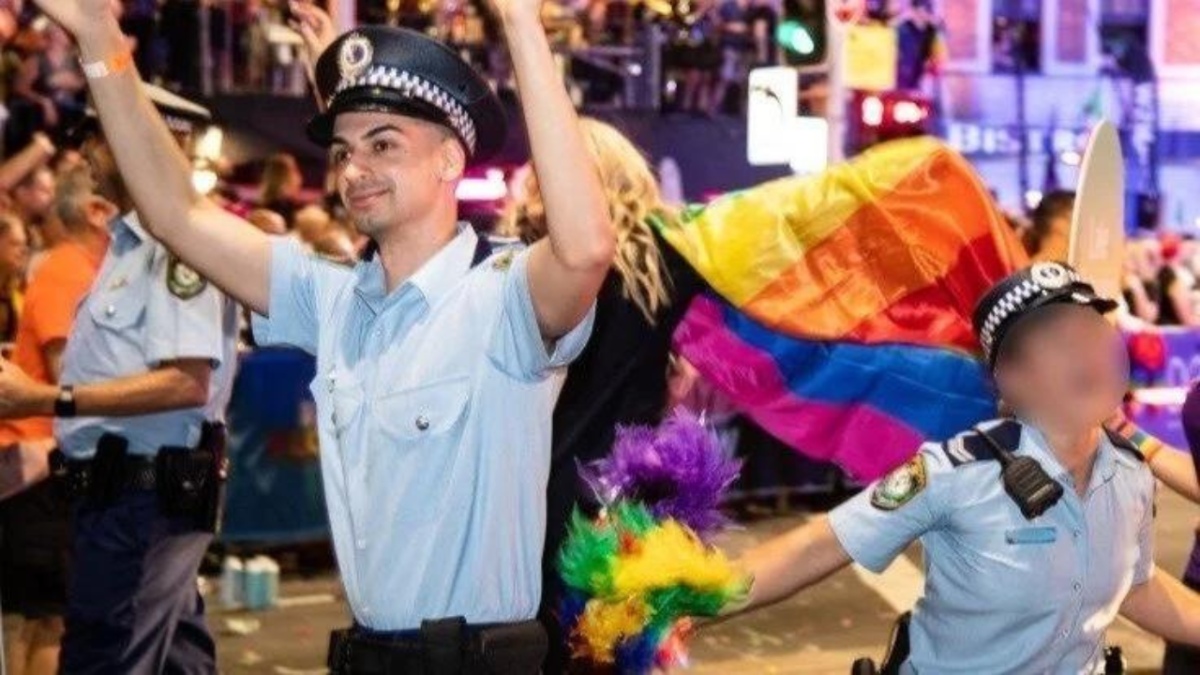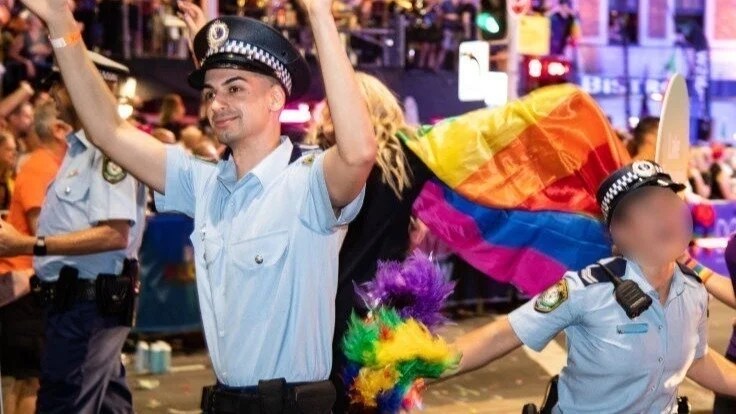
CONTENT WARNING: This article discusses homophobia and alleged murder.
The suspected murder of Sydney couple Luke Davies and Jesse Baird allegedly at the hands of a NSW police officer has prompted renewed calls for uniformed police officers to be banned from marching at Mardi Gras. However, NSW Premier Chris Minns and NSW Police Commissioner Karen Webb have called such calls “regressive” and “backwards”.
NSW Police officer Beau Lamarre-Condon is accused of killing his former partner Jesse Baird and Baird’s boyfriend Davies at a Paddington home on Monday last week, while he was on duty and allegedly with a police issued firearm. Lamarre-Condon has been charged with two counts of murder, and the bodies of Baird and Davies are yet to be recovered.
The deaths of the couple allegedly at the hands of a police officer, coupled with images of Lamarre-Condon in uniform marching at Mardi Gras, have further charged the long-running debate over whether police officers should be allowed to march at Mardi Gras.
The pride event began in 1978, with original marchers — known as the 78ers — subject to police brutality and outing by the media. However, twenty years later, police joined the parade, which has been controversial among queer groups ever since.
“It’s time we say ‘no more’ to [alleged] killer cops marching in our parade,” activist collective Pride in Protest wrote in a statement on Instagram.
“Mardi Gras began as a protest against police violence towards our community. The violence has not ended, and so our protest can’t either.”

Comments on a Change.or petition have similarly called for police to refrain from attending the parade.
“Police continue to be unsafe for our community. They continue to harm us. With the recent news of a police officer [allegedly] murdering a gay couple — it’s extremely inappropriate for them to march in the parade,” one person wrote.
“Police have a long history of violence against queer people, their presence is not only threatening to the attendees but a slap in the face to every activist and rioter that started pride parades in the first place. You cannot ignore history for the sake of corporate sponsorship,” said another.
Chris Minns, however, has defended NSW Police and insisted its officers should still march in the parade despite the backlash.
“I have to say, I think police should march,” Minns told 2GB radio.
“It should be really acknowledged that there’s a lot of gay and lesbian members of the NSW police force. Traditionally, they are the group that have fought for the right to march and that has been seen in recent years as a real effort to bring the community together.”
He said other police officers “shouldn’t be held responsible for” the “serious” allegations against Lamarre-Condon.
“A lot of serving police officers who identify as gay have suffered a lot of discrimination but stuck within policing as a profession,” he said.
“They marched in the Mardi Gras as a demonstration of the fact that they’re police officers, and that’s their sexuality. Yanking their invitation, I think, would be a regressive step and probably not indicative of the fact that they’ve gone through a lot to be a police officer.”

NSW Police Commissioner Karen Webb also said in a press conference on Monday that it would be “a real travesty” if NSW Police were unable to march, claiming that police participation was a part of healing bridges between law enforcement and the queer community.
“We have been building a bridge with the gay and lesbian community since the 78ers were mishandled by police back on the day,” she said, referring to the infamous Saturday night in 1978 when NSW police officers attacked a group of activists who were calling for the decriminalisation of homosexual acts in a street parade.
The public’s outrage at the brutalisation of protesters that night birthed the annual Sydney Gay and Lesbian Mardi Gras as we know it today — so, in a way, the Mardi Gras parade has always existed in opposition to police, even if cops now march as part of it.
“We have been participating in Mardi Gras for the last 20 years and haven’t missed a year,” Webb continued.
“I would hate to see that this is the year that we are excluded because of the actions of one person that is not gay hate related.
“It would be a real travesty for this organisation to be excluded. It is an event on the calendar that we as an organisation look forward to, to participate in, but including many of my officers who seek approval to participate, who are also members of the community, and to shut the door on them would set us backwards.”
The No Cops at Pride movement has, of course, long preceded the tragic deaths of Baird and Davies. It’s been alive since 1978, and has gained even more momentum after a damning inquiry into LGBTIQ hate crimes in NSW found police officers were “indifferent, negligent, dismissive or hostile” to those reporting gay hate crimes.

The inquiry, which released its findings in December last year, called for fresh inquests into the deaths of several men, and Justice John Sackar noted “shameful homophobia, transphobia and prejudice” was still alive and well within the police force.
Mardi Gras has not released a statement on how it plans to proceed with NSW Police, but its organisers will meet soon to discuss the issue.
- If you’d like to talk about the issues raised in this story, you can call the QLife LGBTI peer support hotline on 1800 184 527 or chat online.
- QLife operates between 3pm and midnight daily.
- Under 25? You can reach Kids Helpline at 1800 55 1800 or chat online.



